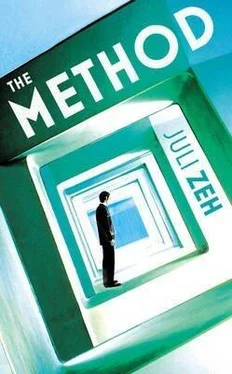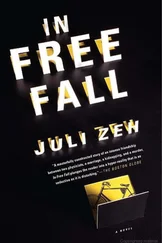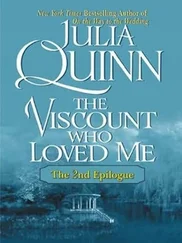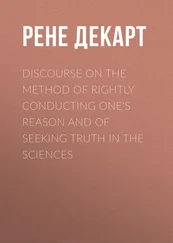‘No,’ he says.
‘That’s the difference,’ says Mia. ‘ I am. My fanaticism is a weaker, paler version of yours.’ She lowers the needle. ‘Can you believe I went to the trouble of getting this needle because I wanted to jab you in the eye and pierce your brain. That’s how much you mattered. I’m wiser now: the sharpest weapons should be directed against the self.’
Kramer doesn’t try to stop her. A few seconds ago, he watched while she threatened him with a needle, now he watches while she prepares to harm herself. Wrinkling his nose in disgust, he steps back as she rolls up her left sleeve, pats her upper arm and raises her right hand. The speed of entry isn’t curbed by doubt. The needle buries itself in Mia’s arm, deep below the skin.
‘Which of us,’ asks Kramer, turning away, ‘is the criminal now?’
‘If you’re starting to doubt yourself,’ says Mia through gritted teeth, ‘don’t worry. I assure you: no one is more despicable than you.’
Blood is coursing down her arm, forming crimson pools on her paper suit. Twisting her head as far as possible to get a better view, Mia grips the needle firmly and drags it in circles to open the wound.
‘This here,’ she says, ‘is your work. You are the needle, the arm, the blood. You are the rightful owner of the sorry remains of what used to be a contented woman — whatever that means. You should listen to yourself, Heinrich Kramer. First you destroy me; then you accuse me of having nothing to lose. I like a man with a sense of humour!’ Her head shakes uncontrollably as she is seized by a spasm. ‘See how you value your superior reasoning, your analytical distance! You pride yourself on not being a fanatic, but do you know the truth? You’re worse than a fanatic: you’re a fanatic embarrassed by your fanaticism. Shall I tell you what makes that especially repellent?’
‘By all means. But have pity on me, Mia. You’re making me nauseous with all that digging into your flesh.’
But Mia has no intention of halting her investigation into the bleeding wound.
‘A fanatic,’ she says, ‘is someone who clings to his ideas like a child to his mother’s skirt. He wants to be mummy’s darling; only then will he be happy and fulfilled. But that’s not enough for Heinrich Kramer. He wants to be mummy’s darling and he wants to despise her.’ She laughs. ‘You style yourself as a free thinker and a martyr, but it all comes down to a conceptual sleight of hand.’
‘Mummy’s darling … A telling analogy, don’t you think?’
‘Only with regard to you . Your mother is the Method and you’re shuddering with desire for the prime position at her breast. Maybe my last task on Earth is to teach you what it means to be an adult. Watch carefully — ah, here it is!’
Mia is crouched over her arm. She digs her fingernails into the wound.
‘You’re talking like a bad loser,’ says Kramer. He sounds less sure of himself than usual.
‘Winner? Loser? You’re wasting your time! Who do you think is going to judge us? We’ve climbed too high, the storms are below us, the air is too thin. We can scream, but we won’t get an answer; we won’t even hear an echo. You want to know if you’re a fanatic or a martyr? No one is going to tell you. You’re asking questions of the void! You want to cast yourself as a good person in spite of everything; a better person than me? Go right ahead. The universe doesn’t care. And neither do I.’
‘This isn’t a moral dilemma; I merely wanted to know—’
‘Look, Kramer, a present for you.’ Mia holds out her hand and offers him the bloody microchip from her arm. ‘Take it. It’s me. It is rightfully yours. Turn it into a pendant or something.’
‘Thank you,’ says Kramer, taking out a white handkerchief and picking up the chip.
‘The rest of me stays here and belongs to no one, therefore to everyone.’ Mia allows herself to slide sideways off the chair to the floor. ‘Completely vulnerable; completely free. A sacred state. You can go now. The rest of me wants to sleep.’
Kramer starts to say something and stops when he realises her eyes are already closed. For a few seconds he gazes at her peaceful face, then he shrugs.
‘The false pride of the martyr,’ he says. But even he doesn’t seem to trust the scorn in his voice.
‘FORGIVE ME, MIA. I’m so sorry.’
Everyone is there. In Mia’s blurred vision, the courtroom stretches to infinity, the rows of spectators filling her view. She looks in vain among the black-robed mannequins for the woman with the blonde ponytail. Instead she sees that the middle chair has been claimed by a grey-bearded judge. She recognises him from last time, and she didn’t know how to get through to him then.
Mia is so distracted by the commotion that she barely pays attention to the hands that a moment ago were gripping the bars of her cage, or to the voice begging forgiveness over and over again. We can assume that the hands and voice belonged to Rosentreter, who has vanished from Mia’s view. Perhaps they have dragged him away. Mia finds it not unpleasant being locked in a cage. She is a theatregoer, watching the spectacle from a private box. The only irritation is the hissing of the atomisers, one in each corner of the cage, releasing clouds of disinfectant. The pauses between squirts are like the moments of darkness in the flickering light of the cell where Mia suspects she lost her mind. Everything she can see and hear seems to have sprung from a crazed imagination. The black mannequins are presiding over crowds of shouting and chanting people. From what Mia can make out, they are calling for her head, although she can’t see the use of a head without its contents. At the front of the room, the bearded judge, who looks even more miserable than usual, bangs his gavel.
At last it is still. A doctor in a white coat approaches the cage. Mia shrinks away from him, as if he were intending to put electrical contacts on her fingers and toes. The guards push her into a corner with their sticks. The doctor reaches an arm through the bars and scans Mia’s bicep. Everyone’s gaze is fixed on the projection wall, which shows an empty rectangle of light. Mia laughs. The atomiser hisses. The scanner emits a piercing beep. The doctor notices the scab on Mia’s arm and hurries to the front of the room to whisper something to the presiding judge, who nods.
‘The court is ready,’ says Hutschneider. ‘The Method versus Mia Holl.’
A black mannequin rises and turns his face towards Mia. It is Prosecutor Barker. As he reads out a practically endless list of charges, Mia slowly begins to grasp what is going on.
‘Orchestrating a terrorist campaign,’ says Barker. ‘Conspiring to murder Sibylle Meiler. Attempting to cause civil unrest. Defying the orders of armed officials.’
Each of the leading players is given a last chance to take to the stage like actors giving a final curtain call. It is fitting, thinks Mia. A nice idea.
‘Anti-Method activities. Subverting the Method and its administrative organs. Consorting with persons hostile to the Method. Using violence against representatives of the Method. Inciting civil disobedience. Disturbing the peace.’
Mia raises her arms, preparing to applaud.
‘Conspiring to contaminate the drinking supply. High treason. Leadership of a terrorist organisation. The prosecution demands the maximum sentence: freezing of the defendant for an unlimited term.’
When Barker falls silent, Mia is the only one to applaud.
A member of the public leaps to his feet. ‘Stop the witch hunt!’ he shouts. ‘No more show trials!’
His neighbours pull him back down. A few voices murmur their agreement; others drown them out. Judge Hutschneider uses his gavel.
Читать дальше












